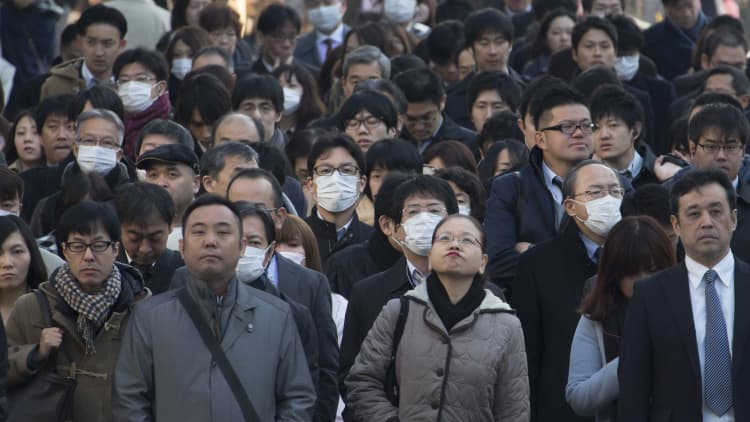Japan has some of the longest working hours in the world.
Nearly one quarter of Japanese companies require employees to work more than 80 hours of overtime a month, according to a 2016 government survey. Those extra hours are often unpaid.
And the Japanese aren't taking enough time off, either. A study by Expedia found that Japanese workers on average didn't use 10 of their paid vacation days, and 63 percent of Japanese respondents felt guilty for taking paid leave.
Yet long work hours don't necessarily mean high productivity. In fact, Japan has the lowest productivity among G-7 nations, according to data from OECD Compendium of Productivity Indicators.
'Death by overwork'
The term "karoshi" translates to "death by overwork" in Japanese, and is a legal term recognized as a cause of death.
An employee of Japan's largest advertising firm, Dentsu, jumped to her death in 2015. The cause was said to have been depression caused by overwork.
The case generated widespread attention and renewed calls to change the long working hours and illegal unpaid overtime highly common in Japan.
Dentsu's CEO resigned over the controversy and the company was fined for violating labor standards as she had been reportedly forced to work 100 hours of overtime a month.
After the death, Dentsu made changes within the company, including turning off lights in the office at 10 p.m. in an effort to force employees to leave.
A cultural challenge still looms
Both Japan's government and its companies say they're now actively endeavoring to reduce working hours throughout Japan. The government considered several initiatives to curb the number of hours spent at the office, including making it mandatory to take at least five vacation days per year and requiring a "rest" period between the end of one day and the start of another.
In 2016, a new holiday "Mountain Day" was started, bringing Japan's number of annual public holidays to 16.
Last year, the government launched an initiative called Premium Fridays, in which it encouraged companies to allow their employees to leave at 3 p.m. on the last Friday of the month.
But a study found that not even 4 percent of employees in Japan actually left early on the first Premium Friday.



